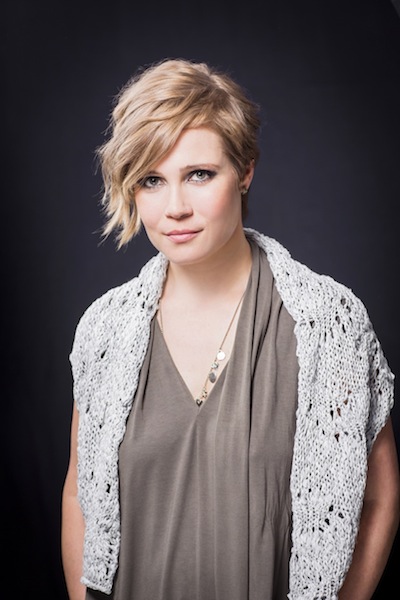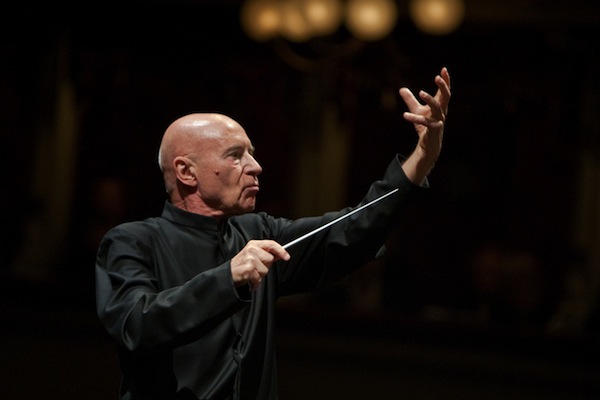Back to the future with Eschenbach, NSO and Josefowicz

Leila Josefowicz performed Oliver Knussen’s Violin Concerto with Christoph Eschenbach and the National Symphony Orchestra Thursday night. FIle photo: Chris Lee
Christoph Eschenbach may have stepped down as music director of the National Symphony Orchestra last June, but he has committed to several return performances in the first season of his successor, Gianandrea Noseda.
The first of these emeritus programs, heard Thursday night in the Kennedy Center Concert Hall, was almost a copy of an Eschenbach program from 2016. That one combined Schumann’s Fourth Symphony with the Salonen Violin Concerto (“Out of Nowhere”), while this one put Schumann’s Third Symphony with Oliver Knussen’s Violin Concerto.
Leila Josefowicz, an exemplary champion of contemporary music for the violin, was the soloist for both concerts. She is in the midst of a season-long semi-residency with the NSO, and she last performed the Knussen in Washington with the composer at the podium in 2009. From the opening peal of sound, a bell strike married to a perilously high note on her violin, Josefowicz attacked this colorfully orchestrated, constantly moving piece with brio and humor.
A raw buzzsaw-like sound on the low string of Josefowicz’s violin fit into the shifting textures of the first movement, in which the orchestra often responds with bluesy activity to the solo part’s speech-like rhythms, implied by the movement title, “Recitative.” Knussen masterfully envelops his soloist in an ideally sized soundscape, engineered with care by Eschenbach, always a skilled accompanist.
The middle “Aria” movement, in particular, with its silvery colors of harp, flutes, and celesta, cast Josefowicz in a Scheherazade-like storytelling role, and the narrative she spun forth was compelling. Josefowicz’s playful side came to the fore in the concluding “Gigue,” rollicking alongside the orchestra in a dance-like compound meter until the piece came to rest on the same peal of sound that opened the concerto.
Eschenbach took a rash approach to the concert opener, Brahms’s Variations on a Theme by Haydn, a lack of patience that stood out after a half-season with the orchestra in new hands. The catchy theme, known as the Choral St. Antoni, is no longer attributed to Haydn, but it elicited excellent playing from the woodwinds and brass, particularly the prominent blat of the contraforte.
Pressed tempos and an over-urgent beat put sections of the orchestra slightly off from one another, such as the horns in the third variation and in other places. The theme’s triumphant return, however, capped the piece with plenty of excitement.

Christoph Eschenbach
Results proved better with Schumann’s Third Symphony, which concluded the concert. Known as the “Rhenish,” Schumann composed the work after he and and his wife, Clara, made a happy trip along the Rhine early in his doomed time as music director in Düsseldorf. Eschenbach insisted on maximum drama in the piece, emphasizing the churn and tumult of the first movement. The horns especially responded with heraldic force in their surprise entrance as the main theme returned.
The second movement felt somewhat plain by contrast, rather than vivid dance-inspired vignettes, but Eschenbach’s interpretation rose to its high point in the next two movements. Eschenbach was at his most contained in the slow movement, allowing the music to grow on its own, the musicians playing in the most serene and unhurried way. The woodwinds added a pastoral woodsiness to the sound that only increased the impression of a peaceful outdoor scene.
The fourth movement, thought to be based on Schumann’s memories of seeing an episcopal ceremony in the Cathedral of Cologne, soared on the liturgical chorale sound of the amassed trombones and horns. Nowhere does one hear more the influence of Schumann on Wagner than in the brass writing of this movement.
Eschenbach dove immediately into the finale, somewhat frantic in style, taking us back to the churning waters of the first movement, now with more brass to add that extra octane to the sound. It is grim to remember that just three years after the premiere of this symphony, Schumann would attempt suicide by leaping from a bridge into the same river.
The program will be repeated 8 p.m. Saturday. kennedy-center.org; 202-467-4600.
